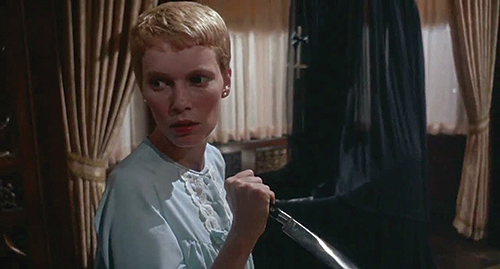A few days ago, the lineup for the 2013 Cannes Film Festival was announced. It features two films by Roman Polanski: his latest, a French-language adaptation of the play Venus in Fur starring his wife, Emmanuelle Seigner, in the lead role; and Weekend of a Champion, a previously unseen documentary about a Formula One racer made in 1972.
The devil in the details

A few days ago, the lineup for the 2013 Cannes Film Festival was announced. It features two films by Roman Polanski: his latest, a French-language adaptation of the play Venus in Fur starring his wife, Emmanuelle Seigner, in the lead role; and Weekend of a Champion, a previously unseen documentary about a Formula One racer made in 1972.
Polanski is one of the last surviving masters of directing whose work has inspired countless modern filmmakers. He’s still working, and he’s still relevant.
The 1968 classic Rosemary’s Baby is probably my favorite Polanski film, not only because I’m a big fan of the horror genre but also because it’s one of the most intelligent, delightfully creepy horror movies ever made.
The film stars Mia Farrow as Rosemary Woodhouse, a young woman who moves into a new apartment building with her actor husband, Guy, played by John Cassavetes. The building is plagued by rumors of the occult, but of course the couple don’t believe them.
They make friends with their elderly neighbors, played by Sidney Blackmer (who died five years later) and the fantastic Ruth Gordon three years before she played Maude in Harold and Maude.
Shortly after they become friends and following a bizarre incident involving drugged chocolate pudding, Rosemary becomes pregnant. If you have a fairly decent knowledge of pop culture you know what happens next, but I won’t spoil the details.
Rosemary’s Baby is one of Polanski’s earlier films, and it exemplifies his distinct style. He often creates an atmosphere of sinister paranoia—the feeling that, at any moment, something could go terribly wrong.
And yet Polanski’s rarely heavy-handed or over the top, like De Palma or Coppola. The film, based on Ira Levin’s horror novel of the same name, always manages to leave you wanting more.
It’s interesting to also look at the historical context. Rosemary’s Baby was released in June of 1968 to enormous critical and commercial success, and it effectively put Polanski on the map as a commercial director.
In August of 1969, barely more than a year later, Polanski’s pregnant wife, actress Sharon Tate, was brutally murdered in the couple’s living room while he was working abroad. Five years after that he made his legendary classic, Chinatown.
These days, people are more familiar with Polanski for his 1977 statutory rape conviction than for his films, or indeed for any of the other details of his personal life.
It really bothers me when people reject art based on who the artist is or what he has done, but it also bothers me when people try to completely separate the two. Polanski’s precise and sometimes warped views of female characters and femininity could fill an entire book.
Is he a fetishist? Is Rosemary portrayed as inherently weak? Or is he satirizing this view of her? It’s worth exploring.
But probably the most interesting piece of trivia about the shooting of Rosemary’s Baby, or the thing I always remember, has to do with a more straightforward form of misogyny care of Frank Sinatra.
Sinatra and Farrow were married at the time, and landing the role of Rosemary was a huge coup for the relatively unknown Farrow.
But when Sinatra tried to force Farrow off Rosemary’s Baby to work on his own film and she refused, Sinatra had her served with divorce papers right in the middle of the set in front of everyone. Hopefully, the film’s immense success gave her the last laugh.
They say films, like novels, change over time, which is why many of the suspense-building conventions in Rosemary’s Baby may seem out of place or even laughable today.
But the film holds up much better than similar movies of its time thanks to its poignancy and creepiness. The child inside Rosemary is ravenously draining the life out of her, and the idea that the true monster of the story might be the thing she is designed to love the most has kept this film firmly in our cultural lexicon.
Rosemary’s Baby
Friday, April 26, at 7 p.m. and 9:30 p.m.
Saturday, April 27, at 7 p.m. and 9:30 p.m.
Sunday, April 28, at 3 p.m.
510 SW Hall St.
$3 general, free for students
Before he was a widower or a philanderer or a criminal, Polanski was a Polish Jew hiding from the Nazis, parentless from the tender age of 6.
If you’re interested, there are several books on his experiences with starvation, his desperate attempts to assimilate with Catholics and the severe beatings that have left him with a plate in his head to this day.
Who better than a Holocaust survivor to make films about paranoia and fear? Who better to evoke the constant threat of violence or, in the case of Rosemary’s Baby, the consumption of the entire world by evil?
Love him or hate him, the man has lived through a lot. It’s fascinating to see how he’s evolved as a filmmaker, and it’s fascinating to see films like this that show you why Roman Polanski was such a big deal in the first place.






